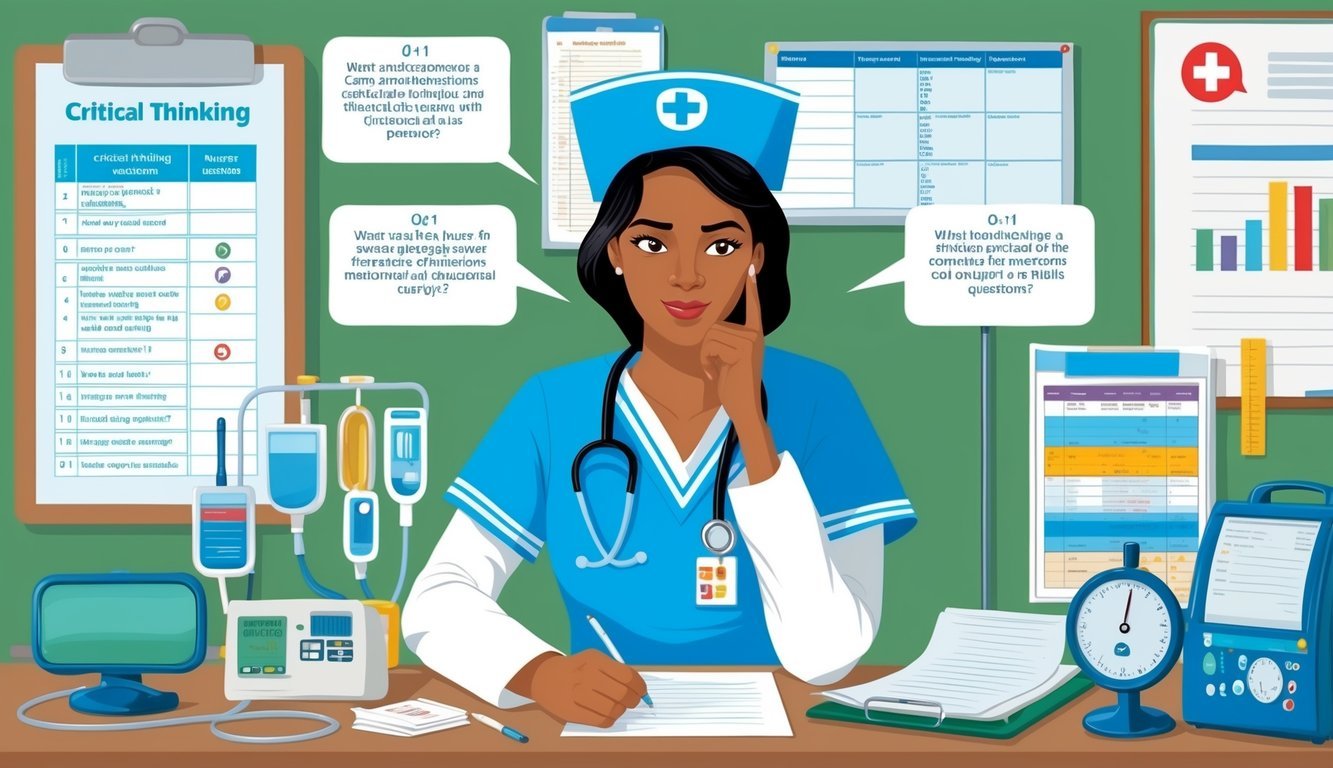Critical thinking in nursing is essential for providing high-quality patient care.
It enables nurses to assess situations, make informed decisions, and implement effective solutions.
As a nurse, your ability to think critically not only enhances patient outcomes but also contributes to your professional growth and development.
In a fast-paced healthcare environment, being able to analyze information and reflect on your actions is critical.
You will often face complex scenarios where quick thinking and a solid foundation of knowledge are necessary.
The more you cultivate this skill, the better equipped you will be to navigate challenges in patient care and teamwork.
Understanding the components of critical thinking can help you improve your nursing practice.
By recognizing its importance, you can develop strategies to enhance your skills and apply them effectively in your daily work.
Key Takeaways
- Critical thinking is vital for effective decision-making in nursing.
- You can enhance your critical thinking skills through practice and self-reflection.
- Applying critical thinking leads to better patient outcomes and professional growth.
Concept and Importance of Critical Thinking in Nursing
Critical thinking is essential for nurses in providing quality patient care.
It allows you to analyze situations, make informed decisions, and improve patient outcomes.
Understanding how critical thinking fits into nursing practice is vital for your success.
Defining Critical Thinking in Nursing Context
Critical thinking in nursing refers to the ability to process information, analyze data, and apply clinical judgment to make sound decisions.
This involves using evidence-based practice and integrating knowledge from various sources.
As a nurse, you must question assumptions, recognize biases, and evaluate the implications of your decisions.
Critical thinking skills include analysis, evaluation, and inference.
These skills help you assess patient conditions accurately and determine the best interventions.
You can enhance your critical thinking by engaging in reflective practices and seeking feedback from peers.
For more on developing these skills, visit Critical Thinking in Nursing.
Impact on Patient Care and Outcomes
Utilizing critical thinking significantly impacts patient care and outcomes.
When you apply these skills effectively, you improve your ability to solve complex problems.
This results in quicker and more accurate clinical decisions, leading to better health outcomes for patients.
For example, effective critical thinking can help identify the early signs of complications, allowing for timely interventions.
This proactive approach ensures that you provide patient-centered care while focusing on safety and quality.
Moreover, critical thinking enhances your ability to communicate with patients and their families.
This fosters trust and encourages shared decision-making, which is crucial for promoting patient satisfaction and adherence to treatment plans.
Roles in Nursing Process and Clinical Decision-Making
In the nursing process, critical thinking plays a vital role in each phase, from assessment to evaluation.
During assessment, you gather data and recognize patterns through observation.
This informs your clinical judgments and helps identify patient needs.
In the planning and implementation stages, critical thinking guides your decision-making.
You prioritize interventions based on the patient’s condition and preferences.
Continuous evaluation of care effectiveness allows you to adjust strategies as needed.
This dynamic approach ensures that you remain responsive to changing patient needs and encourages lifelong learning.
Emphasizing critical thinking enhances your role as a professional nurse, allowing you to advocate effectively for your patients and ensure high-quality nursing care.
For further insights, check out Why Critical Thinking is Important in Nursing.
Development and Enhancement of Critical Thinking
Critical thinking is essential in nursing.
You can improve your skills through structured educational strategies and continued professional development.
These approaches are crucial in developing the ability to make sound decisions and provide effective patient care.
Educational Strategies in Nursing Education
Nursing education incorporates various strategies to enhance critical thinking.
One effective method is the use of simulation.
This allows students to practice in realistic scenarios, developing both critical thinking and clinical skills.
Problem-based learning (PBL) encourages you to think independently and work collaboratively.
In PBL, you analyze complex, real-world problems.
This approach develops reasoning skills and fosters teamwork.
Case studies help you apply theoretical knowledge to practical situations.
Analyzing these cases sharpens your decision-making abilities.
Educational institutions often combine these methods to ensure a well-rounded learning experience.
Improving Critical Thinking Among Nursing Students
To strengthen critical thinking among nursing students, it is important to cultivate certain attitudes.
Encouraging curiosity and open-mindedness can drive your analytical skills.
You should question assumptions and consider multiple perspectives.
Structured reflection is another effective tool.
By reflecting on experiences, you can evaluate your thought processes and learning outcomes.
This is beneficial for both personal growth and professional development.
Additionally, engaging in peer discussions can enhance your understanding.
Sharing insights with classmates allows you to see different viewpoints and learn from others’ experiences.
Continued Professional Development for Nurses
Continued professional development plays a key role in enhancing critical thinking for practicing nurses.
Keeping updated with the latest research is important.
Regularly reading nursing journals allows you to stay informed and apply new knowledge to your practice.
Participating in workshops and conferences also offers chances to learn and network.
These events often focus on current issues and innovative practices in nursing, encouraging critical thinking.
Engaging in interdisciplinary collaboration can further boost your critical thinking.
Working with professionals from other fields gives you a broader perspective on patient care.
This can lead to more effective and comprehensive solutions to complex health issues.
Practical Application of Critical Thinking in Nursing

Critical thinking is essential in nursing for making informed decisions that affect patient care.
It enables you to assess situations accurately, plan appropriate interventions, and evaluate outcomes effectively.
Assessment and Diagnosis
In the assessment phase, you gather vital information about your patient’s health status.
This includes conducting physical exams, reviewing medical histories, and asking specific questions.
Using critical thinking helps you interpret the data accurately and identify potential nursing diagnoses.
You may consider factors such as symptoms, patient history, and even mental status.
A well-constructed assessment leads to a clearer diagnosis.
For example, noting unusual changes in a patient’s vital signs could indicate a serious condition.
Engaging in self-awareness during this process enhances your ability to recognize biases or assumptions, which is essential in delivering quality care.
Planning and Implementation
During planning, you develop a tailored care plan that addresses identified health problems.
Here, critical thinking plays a crucial role in setting achievable goals and selecting appropriate nursing interventions.
When planning medication administration, you prioritize safety by checking for potential medication errors.
You might use tools like the SMART criteria (Specific, Measurable, Achievable, Relevant, Time-bound) to outline your objectives clearly.
Implementation involves executing the care plan with precision.
This is where clinical reasoning comes into play.
You must adapt your interventions based on real-time patient responses.
For example, if a patient shows an allergic reaction, quickly reassessing and altering the plan is key to their safety.
Evaluation and Nursing Intervention
In the evaluation phase, you assess the effectiveness of the interventions.
This requires a thoughtful analysis of patient responses to the care provided.
You collect feedback and review the outcomes against the expected goals.
If results indicate a lack of improvement, you need to reevaluate your approach.
This might mean altering nursing diagnoses or changing interventions based on what you observe.
For example, if a patient’s pain remains unmanaged, you may need to adjust medication dosages or explore alternative pain management strategies.
Cognitive Skills and Attitudes in Critical Thinking
Critical thinking in nursing relies on both cognitive skills and essential attitudes.
These elements work together to enhance your problem-solving abilities and ensure patient care is grounded in sound reasoning.
Understanding these skills and attitudes can significantly improve your effectiveness as a nurse.
Key Cognitive Processes
Cognitive processes are vital for effective critical thinking.
These include skills such as analysis, evaluation, and inference.
- Analysis: You break down information into smaller parts to understand its components. This helps in assessing patient data like vital signs and lab results.
- Evaluation: This involves judging the credibility and relevance of information. You need to question sources and determine their reliability.
- Inference: This skill allows you to draw logical conclusions from available data. It helps in identifying which treatment options might be best.
Other important skills include problem-solving and decision-making.
By developing these cognitive skills, you will improve your critical thinking, leading to better patient outcomes.
Fostering Essential Dispositions
Along with cognitive skills, certain attitudes are essential for effective critical thinking.
These include:
- Fairness: Being open-minded and willing to consider different perspectives helps in assessing situations accurately.
- Humility: Recognizing your limitations allows for continuous learning and growth.
- Integrity: Upholding strong ethical standards ensures that your decisions are consistent with professional values.
- Perseverance: Sticking with challenging problems until they are resolved shows commitment to patient care.
- Self-confidence: Trusting in your abilities enables you to make informed decisions without second-guessing yourself.
By fostering these dispositions, you can enhance your capacity for critical thinking in nursing situations, improving care for your patients.
Challenges and Solutions in Nursing Critical Thinking
Nurses face several challenges when it comes to applying critical thinking in their practice.
Understanding these barriers is essential for improving decision-making and providing high-quality patient care.
By addressing these issues, you can enhance your skills and contribute to better patient outcomes.
Barriers to Effective Critical Thinking
Several factors can hinder your ability to think critically.
These include:
- Time Constraints: In a busy clinical environment, you may feel rushed, limiting your ability to analyze situations thoroughly.
- Stress and Fatigue: High-stress levels can impact your mental clarity, making it hard to focus on patient assessments.
- Lack of Training: Insufficient education in critical thinking skills can reduce your confidence and competence in clinical decision-making.
Promoting High-Quality Care Through Problem Solving
To enhance your critical thinking, you can adopt various strategies.
Some effective approaches include:
- Education and Training: Pursuing additional training in critical thinking through nursing research can significantly improve your decision-making.
- Reflective Practice: Keeping a reflective journal allows you to analyze your experiences, which can help identify areas for improvement.
- Mentorship: Working with experienced nurses can provide guidance and support, fostering your critical thinking skills.
Frequently Asked Questions

Critical thinking is a vital skill in nursing that enhances patient care and safety.
Understanding how to apply these skills, their key components, and their impact on patient outcomes is essential for effective nursing practice.
How can critical thinking skills be applied in nursing practice?
In nursing practice, critical thinking skills allow you to assess patient needs accurately.
You interpret vital signs, analyze lab results, and evaluate the effectiveness of treatments.
By using these skills, you can make informed decisions and adapt care plans based on the patient’s condition.
What are the key components of critical thinking in nursing care?
Key components of critical thinking in nursing include observation, analysis, and evaluation.
You must observe patient behaviors, analyze the data collected, and evaluate possible outcomes.
This process helps you create effective nursing interventions tailored to each patient’s situation.
Why is critical thinking an essential skill for nurses?
Nurses need critical thinking to ensure safe and effective patient care.
With critical thinking, you can identify potential problems early and intervene before they escalate.
This proactive approach can lead to better health outcomes and increased patient satisfaction.
How does critical thinking in nursing contribute to patient outcomes?
Critical thinking contributes to positive patient outcomes by enhancing decision-making skills.
Your ability to interpret information correctly leads to timely interventions.
This reduces complications and improves recovery times for patients.
In what ways can nursing education foster critical thinking abilities?
Nursing education can foster critical thinking through simulation exercises, case studies, and reflective practice.
These methods encourage you to apply theory to real-world situations.
Engaging in discussions with peers also helps you consider different perspectives and sharpen your critical thinking skills.
What strategies can nurses use to develop their critical thinking skills?
You can develop your critical thinking skills by engaging in continuous learning and reflection.
Strategies include seeking feedback from colleagues, participating in workshops, and utilizing critical thinking frameworks.
These approaches help you refine your decision-making process and improve patient care.
For more in-depth information on critical thinking in nursing, consider visiting NurseJournal.org or NursingWorld.org.

